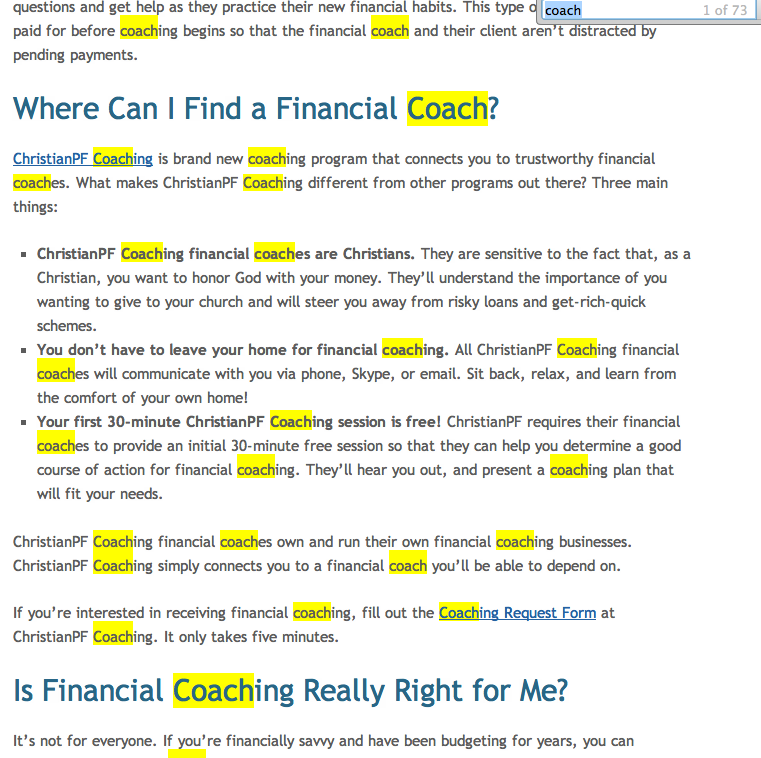Welcome to another edition of the Carnival of Wealth. Personal finance blog posts of varying worth, although after months of doing this it seems that we’ve finally scared away most of the lousy contributors. Thank God. Are you strapped in? Let’s go:
Dave at 6400 Personal Finance was the first to bring to our attention the idea of classifying personal finance strategy into “offense” and “defense”. To encapsulate the idea and omit a few of the crucial details, defense means spending as little as possible. Offense means making as much as possible. Most self-styled experts and personal finance bloggers focus on defense to the exclusion of everything else, because doing so requires zero ambition. They’re everywhere, but the archetype is this mental patient who measures how much energy he consumes every time he opens his oven door.
In the mid-1970s, the Vancouver Whitecaps of the North American Soccer League had a German coach named Eckhard Krautzun (no really, he was German.) Herr Krautzun was the soccer version of a 21st century personal finance blogger, the Whitecaps allowing the fewest goals in the league in 1976. In the words of Vancouver Sun columnist Jim Taylor (possible paraphrase):
If Krautzun had been Emperor of Rome, the Visigoths never would have gotten in. And the Romans never would have gotten out.
Vancouver finished 3rd in a 5-team division that year. By the way, enjoy that because we’ll never feature another soccer anecdote.
PKamp3 at DQYDJ.net gives his take on this revolutionary self-evident idea, while debunking the annoying axiom “Offense wins games, defense wins championships.” A championship is nothing more than winning games. Win enough games, and you’ll win a championship.
There’s nothing more flattering than when a submitter employs a stratagem that we’ve already used, albeit on a grander scale. Bill at Budgets Are Awesome tells us how a friend of his manages to avoid paying American Express’s $175 annual fee, every single year.
Cheap headline pandering from Ted Jenkin, CFP®, AAMS®, AWMA®, CRPC®, CMFC®, CRPS® at Your Smart Money Moves. In between earning designations as a Certified Financial Planner, Accredited Asset Management Specialist, Accredited Wealth Management Advisor, Chartered Retirement Planning Counselor, Chartered Mutual Fund Counselor and Chartered Retirement Plans Specialist, Ted found 3 recommendations for a comfortable retirement. And because there were 3 of them, he called them a “threesome”! Like when 3 people have sex with each other! Isn’t that ribald.
Yeah, but does he have an MBA? Ken Faulkenberry at AAAMP Blog does, and this week he’s angry. Ken blames the stomach punches that the middle class is enduring on 3 people – in chronological order, George W. Bush, Ben Bernanke, and Barack Obama.
Any functioning and reasonably inquisitive 8-year-old should notice that in the parts of the world where the members of the governing class go out of their way to intervene in the economy, said economy stagnates. In societies where rules are few and vigorously enforced, as opposed to legion and arbitrary, the economy burgeons.
Cuba is in the former category, and nobody hops on a flimsy raft to get there. America used to be in the latter category. Really, it was. Today, government intervention in the economy is taken for granted. For instance, there’s a U.S. Senate race in CYC’s home state. Each candidate’s major talking point is the same: “My opponent wants to cut hundreds of billions of dollars from Medicare. I won’t.” Without getting into the niceties of the sentiments, wasn’t there a time when at least one party could be counted on to back cutting spending?
Not to make this breakdown of Ken’s post longer than the post itself, but the Federal Reserve has now taken it upon itself to fine-tune the economy rather than preserve the value of our fiat money by doing like Milton Friedman recommended and increase the money supply by a fixed amount (related to population growth) annually without regard to booms and busts. The man in charge of the Federal Reserve is without check nor balance. The president who appointed him famously “abandoned free-market principles to save the free market system,” whatever that means. The succeeding president doesn’t even bother to pay false homage to the free market system, instead thinking that artificially low interest rates and unlimited bond buying will do anything but prolong and deepen the pain.
But yeah, Ron Paul was the crazy candidate.
One thing we espouse here at CYC is getting to the freaking point. If you’ve ever read a pages-long corporate memo that could have been reduced to one sentence, you know what we mean. The opposite of getting to the point is using euphemism and obscure language in a situation that calls for simple English. Take “quantitative easing”, now in its 3rd round. A fancy if terse way of saying “creating money out of thin air with which to buy assets from ostensibly private banks, in the faint hope that it’ll stimulate the economy.”
It won’t. It can’t. It never will. It’ll effect the economy to be sure, but the latest round of quantitative easing will do only what its predecessors did – put bankers in even greater control of an economy that needs democratization more than anything. Meanwhile, 67% of Ken’s Axis of Incompetence continues unimpeded.
So make lemonade. Dan at ETF Base shows us which exchange-traded funds are gaining the most since QE3 began. (Bonus, and we didn’t even notice this until just now: a comment from Ken himself.)
Darnell Brown at Excess Return echoes Dan’s sentiment, and attempts to determine which stocks and industries will benefit of Bernanke’s latest round of meddling. Precious metals, energy, home builders and…banks. Such as taxpayer charity case Bank of America. May God have mercy on these politicians’ souls.
W at Off-Road Finance is as jaded as we are about QE3, but is spending less time whining about it and more time trying to figure out how to capitalize on it. The market is rigged, you say? No freaking kidding. W also introduces a concept that he (admittedly pompously) calls the Fundamental Theorem of Market Structure. It’s at least as beneficial as the fundamental theorems of arithmetic, algebra and calculus.
Free Money Finance understands offense and defense, although we don’t necessarily agree with his playbook. “Your career is your most valuable financial asset”? Not at CYC headquarters, it isn’t. But what he’s saying makes sense: if you’re committed to working for a living, do what you can to maximize your income in the career you’ve chosen. Be likable, overperform, etc. And our favorite, which has cost Free Money Finance some criticism from dumb people in the past: Be attractive. There’s a reason why no one who looks like William Howard Taft will ever be president again. This post inspired the internet equivalent of a visit from Pons-Brooks comet – an actual intelligent dialogue in the comments.
You’re reading this website, so you’re in the market for a private island, right? Chris Something Polish That We Can’t Spell From Memory And Can’t Be Bothered To Transcribe Letter-For-Letter While Something Else Is On The Clipboard at RPlan Blog reminds you to read the contract and check for water before signing on the dotted line. And don’t buy Kaho’olawe, it’s full of unexploded ordnance.
Isn’t this adorable? A generic new entrant, Jamie at Financial Footsteps. Let’s see how generic.
- Green logo (you know, the color of money? Very subtle.) Check.
- An admission that that he (she?) is just making it up as he goes along? Check.
- Question at the end of the post, posed to the readers in the hopes that they’ll comment? Check.
- No comments? Check.
Jamie also wants to pay off his student loans and save for retirement. And probably also enjoys spending time with family and friends, and wearing shoes to protect his feet while walking, but he didn’t specifically mention so anywhere on his site. Here’s a curious line:
I like to stick with mutual funds and exchange-traded funds rather than complicated investments like individual stocks and bonds.
Not sure how the derivative investment can be less complicated than the underlying security, but hey, it’s his post.
Michael at Financial Ramblings decries unethical CPAs who load up on fees taken from their clients’ portfolios. Michael was his usual brief self, but sums things up succinctly with:
Nobody cares about protecting and/or growing your money as much as you do. You really do need to look out for yourself.
That is, unless you’re an American citizen and have decided to let the federal government handle your retirement. Social Security is orders of magnitude worse than anything a single rogue CPA could be.
John Kiernan at Wallet Blog asks why small businesses are still paying for the War of 1812. When we saw that line we thought he was poking fun at Barack Obama’s budget plan (whereby spending $200 billion less on a war in Iraq than previously counts as a $200 billion asset), but John wasn’t. Rather he explains how business taxes in some states have nothing to do with anything resembling reality, or in some cases anything to do with this century. Or the previous one. Or most of the one before that.
You became a stay-at-home mother? Good for you. In between not doing anything productive, surrounding yourself with screaming and obnoxious brats, watching soap operas and aging yourself faster than the blessedly childless do, you’re also damaging your credit. Liana Arnold at Card Hub explains how the Federal Reserve has increased its purview and expanded past its stated boundaries even further. Now, the Fed has changed the criteria for credit card approvals. Instead of looking at “household” income, issuers now look at individual income. If yours is zero, regardless of what your husband makes, good luck with that. Get a joint account, and have fun figuring out who gets what when you get divorced.
Finally, Dividend Growth Investor explains how to manage your money. Not just by buying dividend stocks, you big silly. Weigh your dividend stocks by yield. Or position. Or something.
Really finally (because of his middling respect for our hard Friday deadline), Andrew from 101 Centavos hits yet another in his streak of home runs. What’s an industry that’s largely recession-proof, largely insusceptible to obsolescence, and that carries some of the fattest profit margins in all of commerce? Some of its major players’ price/earnings ratios are deliciously low, too.
Andrew’s post also includes the best photo caption we’ve seen since the Maxim issue with the bottom half of a guy sitting on the edge of a bathtub (“Elvis: The Final Seconds”).
Glad you could make it. New Anti-Tip of the Day every day, new posts Wednesday and Friday, new CoW every Monday, Investopedia sporadically. Namaste.






